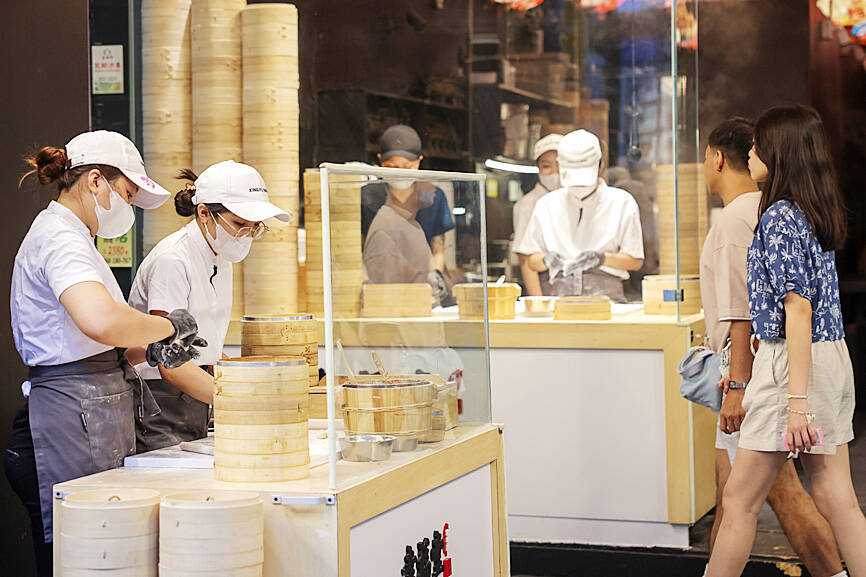The government’s business climate monitor last month turned “yellow-red,” cooling from June’s economic boom, as non-tech firms reported shipment disruptions linked to bad weather, the National Development Council (NDC) said yesterday.
The composite score decreased by 3 points to 35 last month, suggesting that Taiwan’s economy remained in a state of imbalanced recovery, it said.
“Shipments of information and communications technology products remained strong, but exports of non-tech goods took a hit from Typhoon Gaemi,” NDC Economic Department Director Chiu Chiu-ying (邱秋瑩) said.

Photo: CNA
The council uses a five-color spectrum to describe the nation’s economic state, with “red” signifying a boom, “green” indicating stable growth and “blue” suggesting sluggishness. A dual-color reading means the economy is shifting gears to a better or worse state.
Of the nine component measures, exports fell by 2 points and industrial production decreased by 1 point, the council’s latest report showed.
Heavy rainfall disrupted the production and shipments of non-tech goods, but exports of electronics were unaffected, the Ministry of Finance said earlier this month.
Dismissing concerns about the state of the economy, Chiu said the monitor would turn “red” again going forward as other indicators lent support to economic growth.
The index of leading indicators, which seeks to project the economic landscape in the coming six months, picked up by 1.13 points to 105.11, as the indices on export orders, imports of semiconductor equipment, total floor area of new housing starts, labor accession rates, money supply and other gauges all increased, Chiu said.
The leading indicators have climbed for nine months in a row, with a cumulative increase of 6.57 points, Chiu said.
Likewise, the index of coincident indicators, which reflects the current economic situation, rose by 1.04 points to 105.4, with all constituents, including exports, industrial output, average monthly overtime hours and power consumption, moved upward, Chiu said, adding that the index rose for 15 straight months.
In other news, the consumer confidence index this month increased by 2.39 points to 77.75, as Taiwanese became more optimistic about the economy, household incomes and the job market, a survey by National Central University showed yesterday.
The sub-index on consumer prices increased by 4.47 points to 42.88, as products became more expensive due to bad weather, said Dachrahn Wu (吳大任), director of the university’s Research Center for Taiwan Economic Development.
The stock and housing markets continued to boom, creating a sense of wealth inflation for households, Wu said.
However, the reading on the purchases of durable goods, noticeably real estate, dropped by 2.34 points to 109.33 after domestic banks moved to restrain their mortgage operations to avoid angering the central bank.
The monetary policymaker has voiced concern about a potential overconcentration on real-estate lending and is likely to introduce more credit controls next month after its board meeting on Sept. 19.

Sweeping policy changes under US Secretary of Health and Human Services Robert F. Kennedy Jr are having a chilling effect on vaccine makers as anti-vaccine rhetoric has turned into concrete changes in inoculation schedules and recommendations, investors and executives said. The administration of US President Donald Trump has in the past year upended vaccine recommendations, with the country last month ending its longstanding guidance that all children receive inoculations against flu, hepatitis A and other diseases. The unprecedented changes have led to diminished vaccine usage, hurt the investment case for some biotechs, and created a drag that would likely dent revenues and

Global semiconductor stocks advanced yesterday, as comments by Nvidia Corp chief executive officer Jensen Huang (黃仁勳) at Davos, Switzerland, helped reinforce investor enthusiasm for artificial intelligence (AI). Samsung Electronics Co gained as much as 5 percent to an all-time high, helping drive South Korea’s benchmark KOSPI above 5,000 for the first time. That came after the Philadelphia Semiconductor Index rose more than 3 percent to a fresh record on Wednesday, with a boost from Nvidia. The gains came amid broad risk-on trade after US President Donald Trump withdrew his threat of tariffs on some European nations over backing for Greenland. Huang further

CULPRITS: Factors that affected the slip included falling global crude oil prices, wait-and-see consumer attitudes due to US tariffs and a different Lunar New Year holiday schedule Taiwan’s retail sales ended a nine-year growth streak last year, slipping 0.2 percent from a year earlier as uncertainty over US tariff policies affected demand for durable goods, data released on Friday by the Ministry of Economic Affairs showed. Last year’s retail sales totaled NT$4.84 trillion (US$153.27 billion), down about NT$9.5 billion, or 0.2 percent, from 2024. Despite the decline, the figure was still the second-highest annual sales total on record. Ministry statistics department deputy head Chen Yu-fang (陳玉芳) said sales of cars, motorcycles and related products, which accounted for 17.4 percent of total retail rales last year, fell NT$68.1 billion, or

HSBC Bank Taiwan Ltd (匯豐台灣商銀) and the Taiwan High Prosecutors Office recently signed a memorandum of understanding (MOU) to enhance cooperation on the suspicious transaction analysis mechanism. This landmark agreement makes HSBC the first foreign bank in Taiwan to establish such a partnership with the High Prosecutors Office, underscoring its commitment to active anti-fraud initiatives, financial inclusion, and the “Treating Customers Fairly” principle. Through this deep public-private collaboration, both parties aim to co-create a secure financial ecosystem via early warning detection and precise fraud prevention technologies. At the signing ceremony, HSBC Taiwan CEO and head of banking Adam Chen (陳志堅)